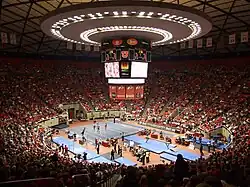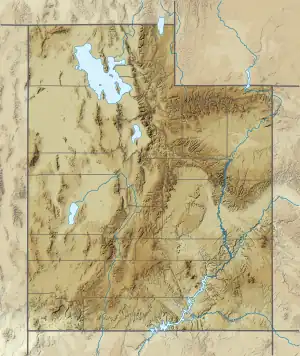Jon M. Huntsman Center
The Jon M. Huntsman Center is a 15,000-seat indoor arena in the western United States, on the campus of the University of Utah in Salt Lake City. It is the home of the Utah Utes of the Pac-12 Conference, the primary venue for basketball and gymnastics.
 Red Rocks gymnastics meet in 2008 | |
 Salt Lake City Location in the United States  Salt Lake City Location in Utah | |
| Former names | Special Events Center (1969–1987)[1] |
|---|---|
| Address | 1825 E. South Campus Dr. |
| Location | University of Utah Salt Lake City, Utah, U.S. |
| Coordinates | 40.762°N 111.839°W |
| Owner | University of Utah |
| Operator | University of Utah |
| Capacity | 15,000 |
| Record attendance | 16,019 (March 6, 2015; gymnastics vs. Michigan) |
| Surface | Multi-surface |
| Construction | |
| Broke ground | 1967 |
| Opened | November 30, 1969[2] |
| Construction cost | $10.392 million ($82.9 million in 2023[3]) |
| Architect | Bruce H. Jensen |
| Tenants | |
| Utah Utes (NCAA Division I) (men's & women's basketball, women's gymnastics and women's volleyball) | |

History
Opened 53 years ago in late 1969 as the Special Events Center,[2] it succeeded Nielsen Fieldhouse as the campus' primary indoor arena.[2] It was renamed in 1987 in honor of chemicals entrepreneur and philanthropist Jon M. Huntsman (1937–2018), father of Utah's former governor Jon Huntsman, Jr.
From its opening until the completion of Vivint Arena in 1991 (as "Delta Center"), the Huntsman Center was one of Salt Lake City's premier sports and entertainment venues (along with the Salt Palace (1969–1993), the home of the Utah Stars (ABA) and Utah Jazz (NBA)).
Architecturally, it was once known for its steel cloud, which hung from the arena's silver dome interior. The steel cloud held the arena's center court scoreboard, sound and lighting systems. The scoreboard was upgraded in the 1980s with the addition of state-of-the-art rear projection video screens. The rear projection system was upgraded in 1995, and replaced in 2006 by four LED video screens. In 2014, the arena was renovated again. The $6 million project removed the steel cloud, as well as added a new floor, LED lights, sound system, drapes, and two grand entrances to house a Hall of Fame and Legacy Hall.
On May 12, 1973, The Jackson 5 performed at the center.[4]
The facility hosted the 1989 Western Athletic Conference men's basketball tournament.
In addition to athletics and concerts, the arena has hosted many academic and intellectual events over the years, such as a public lecture by renowned British astrophysicist Stephen Hawking in 1995, which was reported to be the largest live audience that Hawking had ever addressed at that time.[5]
The facility hosted two games of the Utah Jazz Summer League in 2016 due to a concert at Vivint Arena. In 2017, the Utah Jazz Summer League moved to the Huntsman Center for all six games & four teams due to Vivint Arena undergoing renovations.
The 15,000-seat multi-purpose arena is home to the University of Utah's "Runnin' Utes" basketball teams (men's and women's), "Red Rocks" women's gymnastics team and women's volleyball team. It also hosts concerts, mostly second-tier acts; most premier concerts have been hosted at Vivint Arena (Delta Center).
Utah joined the Pac-12 in 2011 and the Huntsman Center became the largest arena in the conference.
The elevation at street level is approximately 4,780 feet (1,455 m) above sea level, second-highest in the Pac-12.
NCAA tournament
The Huntsman Center hosted the first and second rounds of the NCAA tournament 12 times (1984, 1985, 1987, 1988, 1990, 1991, 1993, 1995, 1997, 2000, 2003, and 2006). It hosted the West Regional Final twice (1971, 1981) and one Final Four (1979). Due to the frequency of hosting first- and second-round games, the Huntsman Center is third all-time in NCAA Tournament games hosted, with 81.
Since 2010, NCAA tournament games in the city have been played at Vivint Smart Home Arena, home of the NBA's Utah Jazz. Other venues for past NCAA games in the state include the Marriott Center in Provo and the Dee Events Center in Ogden.
1979 Final Four
The arena hosted the 1979 Final Four in late March, featuring the start of the rivalry between all-time greats Magic Johnson and Larry Bird.[6] Magic's Michigan State team defeated Bird's previously unbeaten Indiana State in the final on March 26,[7][8][9] which remains the most-watched college basketball game in history. Many observers consider the Magic-Bird rivalry established here and carried into the NBA when both entered the league that fall to be a major factor in the league's 1980s renaissance.
See also
References
- "Attendance and Sites". 2014 Men's Final Four Records Book (PDF). Indianapolis, IN: NCAA Publications. 2014. p. 138. Retrieved February 20, 2015.
- Scott, Ron (December 2, 1969). "No dust, less noise for Utes". Deseret News. (Salt Lake City, Utah). p. B1.
- 1634–1699: McCusker, J. J. (1997). How Much Is That in Real Money? A Historical Price Index for Use as a Deflator of Money Values in the Economy of the United States: Addenda et Corrigenda (PDF). American Antiquarian Society. 1700–1799: McCusker, J. J. (1992). How Much Is That in Real Money? A Historical Price Index for Use as a Deflator of Money Values in the Economy of the United States (PDF). American Antiquarian Society. 1800–present: Federal Reserve Bank of Minneapolis. "Consumer Price Index (estimate) 1800–". Retrieved May 28, 2023.
- Cadman, Chris. Michael Jackson: The Maestro. Pg. 668
- "Deseret News: Hawking Gives 9,000 a Cosmic Thrill". 18 July 1995. Retrieved July 12, 2020.
- Keith, Ron (April 2, 1979). "They caged the Bird". Sports Illustrated. p. 16.
- "'Magic act' gives MSU NCAA title". Deseret News. (Salt Lake City, Utah). March 27, 1979. p. A1.
- Ewer, Bill (March 27, 1979). "Magic keeps a promise and MSU reaches NCAA title goal". Deseret News. (Salt Lake City, Utah). p. 4B.
- "Michigan State grounds Bird - wins title". Spokesman-Review. (Spokane, Washington). Associated Press. March 27, 1979. p. 17.
_(cropped).jpg.webp)